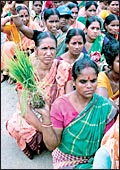 |
| Red signal: Trinamool Congress' Mamata
Banerjee rallies farmers against government land acquisition |
JULY 18,
2006
Singur, 55 km off Kolkata
A
few thousand angry farmers have gathered at Bajemelia Mouza (Singur)
in Hooghly, some 55 kilometres from Kolkata. The brown expanse
is wet, thanks to a light drizzle, but the mood here is anything
but damp. The land that we are standing on is part of the 1,200-acre
site that the West Bengal government wants to acquire for Tata
Motors' small-car plant. There have been sporadic protests in
these parts ever since the state government announced plans to
acquire land for the project, and today the farmers, who have
been asked to stop cultivation of their paddy fields in this area,
are awaiting the arrival of Trinamool Congress supremo, Mamata
Banerjee, who has been championing their cause. "Buddhababu
(Chief Minister Buddhadeb Bhattacharjee) should come here today
to see the strength of the farmers in Singur...the Tatas will
just run away from this place," is the rallying buzz spreading
fast among the farmers.
After a delay of several hours, at 3:20 pm,
Banerjee, or didi, arrives in a shiny new Scorpio. The slogan-shouting
crowd runs amok as didi takes the make-shift stage, a Tata 407.
After a short speech, she suddenly gets down and starts walking
through the muddy field to plant a sapling in a symbolic gesture
of defiance. The crowd, mostly local farmers, follow her. "We'll
give our blood, but not give up our land," shouts Khursheed,
a local farmer in his 40s. Someone else shouts, "Tatas go
back". Didi, however, clarifies: "We are not against
any particular industrialist or industrialisation in general.
We are against forceful acquisition of crop land. Let there be
industry on closed industries' land." (Tata Motors refused
comment.)
Banerjee or her farmer friends in Singur
are hardly the only ones protesting over acquisition of land by
government for development. Over the recent months, there have
been similar protests all over India. In a village called Attipra
near Thiruvananthapuram in Kerala in February this year, revenue
officials were forced to back off from a land survey after villagers
surrounded them in protest over acquisition of 270 acres of wetland
for expansion of a technology park. In early April, hundreds of
people in Chennai formed a two-kilometre long human chain stretching
from Pallavaram to Trisulum in Tambaram to mark their protest
over acquisition of additional land for the Chennai airport. Haryana,
Orissa, Madhya Pradesh are some of the other states that have
witnessed similar protests.
 |
|
|
|
|
| Left in the lurch: The issue for farmers
of Singur, like those elsewhere, is two-fold. Some of them
don't want to sell their farms, while the others aren't happy
with the compensation being offered by the state government |
The issue at the core of such protests is
the same: Farmers either don't want to sell their land or think
they are not being adequately compensated. Given that governments
have the right to acquire any land, there is no legal option available,
except to stage protests. As for the price, apparently, most state
governments follow a standard formula for arriving at the compensation.
Typically, the cost at which land is bought is the average of
the previous six months' market price. Depending on the type of
land and nature of cultivation (single crop or multiple crop)
and intended use of the acquired land, prices range from Rs 80,000
to Rs 3 lakh per acre. However, since the Supreme Court has ruled
that the government cannot fix the market price for land, rather
it must be decided by the buyer and seller, purchase price can
vary from one state to another and within a state too. "More
than 50 per cent of the farmers have already consented to offer
their land across five mouzas (or crop-land demarcated according
to its registration with various panchayats) of Gopal Nagar, Bajemelia,
Khaser Bheri, Singer Bheri, and Barberi," says Abhijit Mukherjee,
block development officer, Singur. "We have not included
multi-crop land, land under extensive cultivation and habitation,"
he adds.
Trinamool's Banerjee pooh-poohs the state's
claims. "These are all bogus names. Either they don't exist
or they don't own any land," she says. But Mukherjee has
an explanation for the protests. "Farmers who do not have
clear papers or do not have clear title or partition deeds fear
that they might not get the compensation. And these are the people
who are creating trouble, who are being instigated," he says.
The protesting farmers themselves, of course, don't agree. "These
farmers have come spontaneously to register their protest and
more will arrive in the coming days," says Becharam Manna,
the convener of the Krishi Jami Bachao Committee.
The state government isn't about to give
up either. The ruling CPI (M) government has set up a core committee
to facilitate land acquisition. People like Ranjit Mondal, a member
of the committee, Srikanta Chatterjee, Secretary of Krishak Sabha's
local unit, and Sruhid Dutta, the sabha's President, are meeting
farmers one-on-one to convince them to part with their land. However,
Mondal says that "farmers are approaching us on their own
to give their land. Already, 483 farmers have offered 412 acres."
Perhaps, but land acquisitions is an issue
that will only get more contentious across India. And the only
way to end this struggle may be to ensure that farmers have a
stake-even if limited-in the new factories and special economic
zones that will rise on their paddy fields. What's needed today
is a land acquisition model that's both transparent and fair.
|








